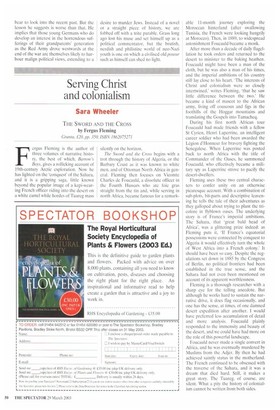Serving Christ and colonialism
Sara Wheeler
THE SWORD AND THE CROSS by Fergus Fleming
Granta, £20, pp, 350, ISBN 1862075271
Fergus Fleming is thc author of three volumes of narrative history, the best of which, Barrow's Boys, gives a rollicking account of 19th-century Arctic exploration. Now he has lighted on the 'conquest' of the Sahara, and it is a gripping saga, little known beyond the popular image of a kepi-wearing French officer riding into the desert on a white camel while hordes of Tuareg mass
silently on the horizon.
The Sword and the Cross begins with a trot through the history of Algeria, or the Barbary Coast as it was known to white men, and of Ottoman North Africa in general. Fleming then focuses on Vicomte Charles de Foucauld, a dissolute officer in the Fourth Hussars who ate foie gras straight from the tin and, while serving in north Africa, became famous for a remark
able 11-month journey exploring the Moroccan hinterland (after swallowing Tunisia, the French were looking hungrily at Morocco). Then, in 1889, to widespread astonishment Foucauld became a monk.
After more than a decade of daily flagellation he took orders and returned to the desert to minister to the baking heathen. Foucauld might have been a man of the cloth, but he was also a man of his times, and the imperial ambitions of his country still lay close to his heart. The interests of Christ and colonialism were so closely intertwined,' writes Fleming, 'that he saw little difference between the two.' He became a kind of mascot to the African army, living off couscous and figs in the foothills of the Hoggar mountains and translating the Gospels into Tamacheq.
During his first north African tour Foucauld had made friends with a fellow St Cyrien, Henri Laperrine, an intelligent career soldier who had been awarded the Legion d'Honneur for bravery fighting the Senegalese. When L.aperrine was posted back to north Africa with the title of Commander of the Oases, he summoned Foucauld, who effectively became a military spy as Laperrine strove to pacify the desert-dwellers.
Fleming uses these two central characters to confer unity on an otherwise picaresque account With a combination of sub-plots, bit-parts and descriptive leavening he tells the tale of their adventures as they galloped about trying to plant the tricolore in flyblown oases. The underlying story is of France's imperial ambitions. The Sahara, that 'great bald head of Africa', was a glittering prize indeed: as Fleming puts it, 'If France's equatorial possessions were connected by conquest to Algeria it would effectively turn the whole of West Africa into a French colony.' It should have been so easy. Despite the regulations set down in 1885 by the Congress of Berlin, no political frontiers had been established in the true sense, and the Sahara had not even been mentioned on account of its apparent worthlessness.
Fleming is a thorough researcher with a sharp eye for the telling anecdote, But although he works hard to sustain the narrative drive, it does flag occasionally, and one has the sense, at times, of one damned desert expedition after another. I would have preferred less accumulation of detail and more analysis. Foucauld plainly responded to the immensity and beauty of the desert, and we could have had more on the role of this powerful landscape.
Foucauld never made a single convert in Africa, and he was eventually murdered by Muslims from the Adjer. By then he had achieved saintly status in the motherland. The French continued to be obsessed with the traverse of the Sahara, and it was a dream that died hard, Still, it makes a great story. The Tuareg, of course, are silent. What a pity the history of colonialism cannot be written from both sides.








































































 Previous page
Previous page